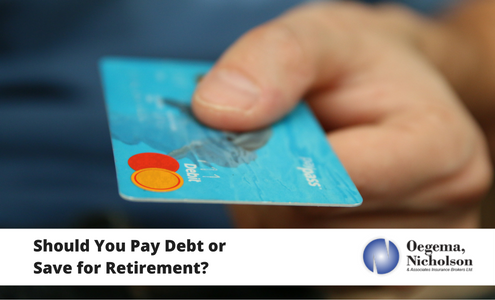
Should You Pay Debt or Save for Retirement?
Canadian debt levels are growing at a faster rate than our incomes are (read the latest report from Statistics Canada). Canadians now owe $1.68 in debt to every $1 made. And while interest rates are low now, they are expected to rise. Credit monitoring agency, Transunion reported that if interest rates were to rise by just one percentage point as many as one million Canadians would be financially stressed. Now is the time to speed up your debt repayment schedule, in advance of the inevitable rise in interest rates. But this begs the question: Does it make more sense for me to pay off my debt, or save for my retirement? 
Before we get to answering that for you, here are few things you need to know:
- The difference between consumer debt and traditional debt
Consumer debt: Debt incurred as a result of purchasing consumable or non-appreciating goods. Typical consumer debt is your credit card purchases or financing options like payday loans.
Traditional debt: Debt that helps you generate income, or increases your net worth. This could include your education, mortgage, or investing in your business.
2. The difference between an emergency fund and retirement savings
Emergency fund: Money set aside to cover you if something unexpected happens. An emergency fund covers unexpected expenses and will save you from going into debt more. It’s recommended you set aside at least 2 months living expenses, and ideally up to 6 months.
Retirement savings: Savings, typically placed in an RRSP program, that is set aside to cover living expenses for you once you retire. It’s money that you set aside, and do not touch again.
For the purposes of this guide we’re referring to consumer debt and retirement savings.
Now on to the question. Long story short: Repayment vs. saving depends on your specific situation.If your debt interest is higher than your savings interest rate: Repay
It costs you money to hold debt. For example, if you’re being charged 12% interest on a $10,000 loan, then you are spending $1,200 each year just to hold that money. In the long run you’ll end up paying more if you continue to pay interest while saving money. In this case, you’re better off paying your high-interest debt before contributing to retirement. Paying off a 15% interest rate credit card means you’re guaranteed to have 15% more income once it’s paid off. That’s money you can re-invest into your savings once you’re no longer incurring the expense.If you’re close to retirement: Save (most of the time)
Experts agree, in an ideal world you should retire debt and mortgage free. But if you’re planning on retiring in the next 10 years and you still have a considerable amount to save, it may make sense for you to split your money between saving and debt repayment. Consider the lifetime value of paying even a small amount into your RRSP now while paying off your debt and take advantage of the compounding interest. You’ll be surprised at how much even a small payment each month can compound over 10 years.If you’re getting matched on your RRSP contributions: Save
If your employer offers matched contributions then always choose to take advantage of the minimum you need to take part in the program. Not participating is like leaving money on the table, and it will make a big difference for you in the long run. This said, still plan on allocating the remaining amount you can afford each to debt repayment.If you’ll end up owing taxes at the end of the year: It depends
Look into whether contributing to your RRSP will lower the amount you’ll owe on your taxes. If you’re going to owe money, you might as well choose to invest in yourself. Depending on the nature of the debt, you can also invest in your RRSPs throughout the year with the plan to divert your return back into debt repayment. No matter what your situation, here are a few helpful debt and saving tips:- Holding consumer debt is typically a sign of living outside your means. Reflect on your monthly and yearly budget and look to see if you need to get control of your spending habits.
- For traditional debt, strongly consider before choosing to accelerate your payment schedule. Don’t use your emergency or retirement savings to pay extra money on your mortgage or car loan now, if it means you may not have enough money later. Your lender won’t re-evaluate payments based on how much you owe so you’re better to keep scheduled payments rather than depleting your savings account.
- Live on less. When building out your budget determine the largest amount you can afford to shift to debt payment each month. Once you pay off your debt, don’t go back to spending that money. Instead, shift the same payment into retirement savings until you’re caught up on your savings goal.

